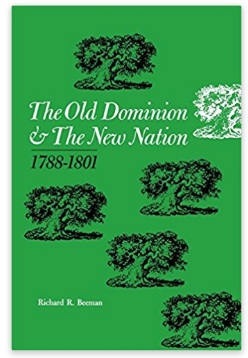We begin our survey of Virginia’s early New Nation history with two surveys of the Federalist Era, “The Old Dominion and the New Nation” and “Chesapeake Politics”.
The last two relate to the bulwarks of provincial establishment in county governments , “Faithful Magistrates and Republican Lawyers” and “Juries and Judges versus the Law”.
For book reviews of this historical period in other topics, see Revolution-Constitution-New Nation. General surveys of Virginia History can be found at Virginia History Surveys. Virginia history divided by time periods can be found at the webpage Books and Reviews.
The Old Dominion and the New Nation

The Old Dominion and the New Nation, 1788-1801 was written by Richard R. Beeman in 1972 and reprinted in 2014. This is an examination of early political party growth in Virginia. The divisions do not seem based so much economic or sectional, but relate to how national politics and local interests played on one another amidst continuing elitist styles of political oligarchy and voter apathy.
The majority party of Republicans was made up of persisting Antifederalists and discontented Federalists alienated by Hamilton’s economic programs. Some democratization in Virginia’s political system was evident while there was a competitive Federalist party, but the 1800 Republican victory slowed the trend and strengthened the ruling elite.
Despite the obvious national roles of Washington, Jefferson, Madison and Marshall, each were bedeviled by county level concerns in their home base. Virginian’s were preoccupied with state sovereignty and local county provincialism. Learn more to buy “The Old Dominion and the New Nation” here for your bookshelf.
Chesapeake Politics

Chesapeake Politics, 1781-1800 was written by Norman K. Risjord in 1978. Here Risjord takes a regional vantage point based on the economic imperatives of tobacco, the largest export not only of the region but of the United States until 1802. The parochial divisions which arose before Constitution and New Nation were rooted in differences between creditors and debtors and they persisted throughout the 1780s and 1790s.
Comparatively inactive majorities of two-to-one led by Patrick Henry in Virginia were outgunned in Assembly coalitions fostered by Madison using county committees, newspaper circulation and petition campaigns. The study focuses on the state legislatures of Virginia, Maryland and North Carolina where Risjord notes a statistical party coherence at 70-80% bloc voting. Absenteeism among factions were sometimes a determining factor, and in the 1790s the new parties grew away from parochial roots due to new men in the legislators and new divisions related to internal improvements and education. Debates began to emphasize national and international issues. Learn more to buy “Chesapeake Politics” here for your bookshelf.
Political Leadership in Jefferson’s Virginia

Political Leadership in Jefferson’s Virginia was written by Daniel P. Jordan in 1983. It is out of print, but may be found in libraries. It draws a composite portrait of ninety-eight members of Virginia’s Congressional delegations, while Virginia’s was first or second largest in Congress during the Virginia Dynasty of presidents from 1801-1825. The book begins with a survey of the state’s geography, demographics, economy and political system.
Virginia’s political establishment was a continuation of pre-Revolutionary elites in a once stable and homogenous society. Though the Dynasty politicians adopted new electioneering strategies such as printed circulars and hustings oratory with personal appeals to voters, the cash crop economy anachronisms of tobacco slave-holders resisted internal improvements and commercial development in ways that led to their inevitable decline in national influence. Learn more to buy “Political Leadership” here for your bookshelf.
Faithful Magistrates and Republican Lawyers

Faithful Magistrates and Republican Lawyers: Creators of Virginia Legal Culture, 1680-1800 was written by A. G. Roeber in 1981 and reprinted in 2011. In Virginia throughout the colonial period, county courts exceeded both the jurisdiction and the prestige of their English counterparts. They adhered to the “country” party rule of English local law in the face of reform efforts by “court” party reformers seeking to enable legislation of Common Law reforms.
In the face of “court” lawyer reforms of the American Revolution the county courts in Virginia faced a relative decline with the rise of trade that had begun in 1748 amidst complaints of class favoritism towards the larger landed slave-holders. Over time, county courts allowed fewer jury trials to maintain county judge authority over local affairs. District Courts were created to further weaken the county courts in 1787, but the “country” parochial ideology gained a rebirth among the Jeffersonian Republicans under the leadership of John Randolph of Roanoke. Learn more to buy “Faithful Magistrates and Republican Lawyers” here for your bookshelf.
Juries and Judges versus the Law

Juries and Judges versus the Law: Virginia’s Provincial Legal Perspective, 1783-1828 was written by F. Thornton Miller in 1994. It features the sustained conflict between Virginia’s legal perspectives of rural agrarianism and the efforts of the newly created U.S. Supreme Court to establish a universal common law promoting commerce.
There were both ideological and economic components to the resistance in Virginia’s courts. Conservatives drew on the English Country ideology in the name of public virtue and individual liberty. Economically, the juries sided with their debtor neighbors.
The two sides were personified in two Virginians, Spencer Roane on the Virginia Supreme Court, and John Marshall on the U.S. Supreme Court. Learn more to buy “Judges and Juries versus the Law” here for your bookshelf.
For book reviews of this historical period in other topics, see Revolution-Constitution-New Nation. General surveys of Virginia History can be found at Virginia History Surveys. Virginia history divided by time periods can be found at the webpage Books and Reviews.

